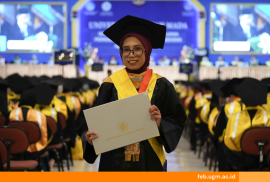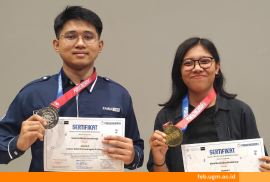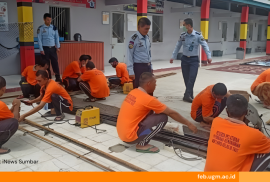
How can students become critical thinkers? This question became the starting point of the session “Critical Thinking: Thinking Hard About Thinking” delivered by Dea Yustisia, S.E., M.Sc., at the Faculty of Economics and Business, Universitas Gadjah Mada (FEB UGM) on Friday (24/10/2025). In this session, Dea encouraged students not only to memorize but also to question and challenge their understanding of things.
Dea also reminded participants that critical thinking is one of the most sought-after skills in today’s job market. Companies are looking for individuals who can analyze, interpret data, and solve problems creatively.
“That’s why it’s not surprising to see philosophy graduates working in data science. Not because they’re good at numbers, but because they possess strong analytical thinking and an exceptional learning endurance,” she explained.
Dea also highlighted the importance of deep reading, especially amid the flood of digital information. Many people read merely to know, not to understand. However, critical reading means tracing the reasons and evidence behind a text. Through critical reading, students learn to distinguish between verifiable facts and opinions that may sound convincing on the surface but lack substantiation.
“Ask, what data is used? Does it make sense? Is there any bias?” she said.
Dea reminded that critical thinking does not mean always being right or winning every argument. On the contrary, it means being open-minded, willing to listen, and ready to admit when one is wrong.
Meanwhile, Anggraeni Pranandari, S.E., M.Sc., shared that critical thinking is not just about finding answers, but also about understanding the reasons behind those answers. She emphasized four key habits that students should cultivate: asking questions out of genuine curiosity, verifying facts, considering multiple perspectives, and making informed decisions. This process trains students to think logically rather than simply following the crowd.
Anggraeni encouraged students to recognize the fundamental steps of critical thinking, observing, questioning, and analyzing, emphasizing the importance of these steps in developing their critical thinking skills. Together, these form a thinking cycle that enables individuals to assess truth more sharply.
“We all think every day, but we don’t always think critically,” said Anggraeni.
She also noted an interesting phenomenon in the digital era: many people have become highly dependent on technology to find answers, yet have lost the ability to think independently. She emphasized that tools are merely aids; authentic learning still lies in the ability to think and write critically.
Reportage: Orie Priscylla Mapeda Lumalan
Editor: Kurnia Ekaptiningrum
Sustainable Development Goals







